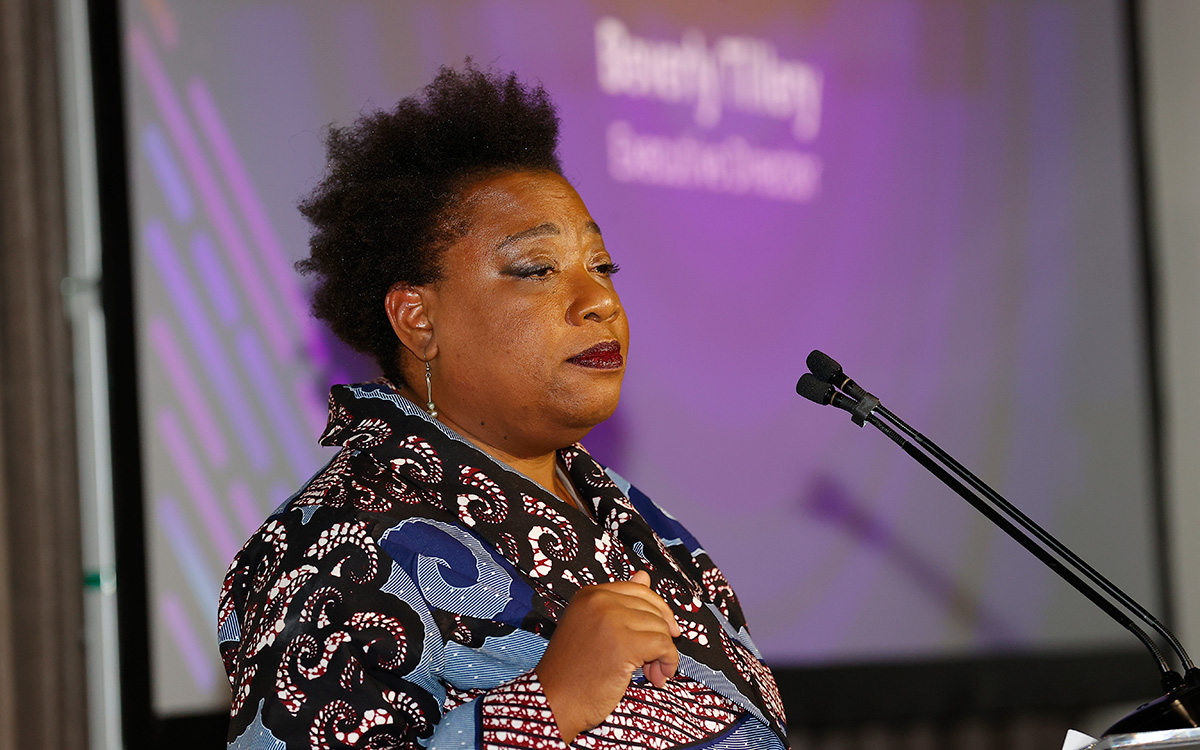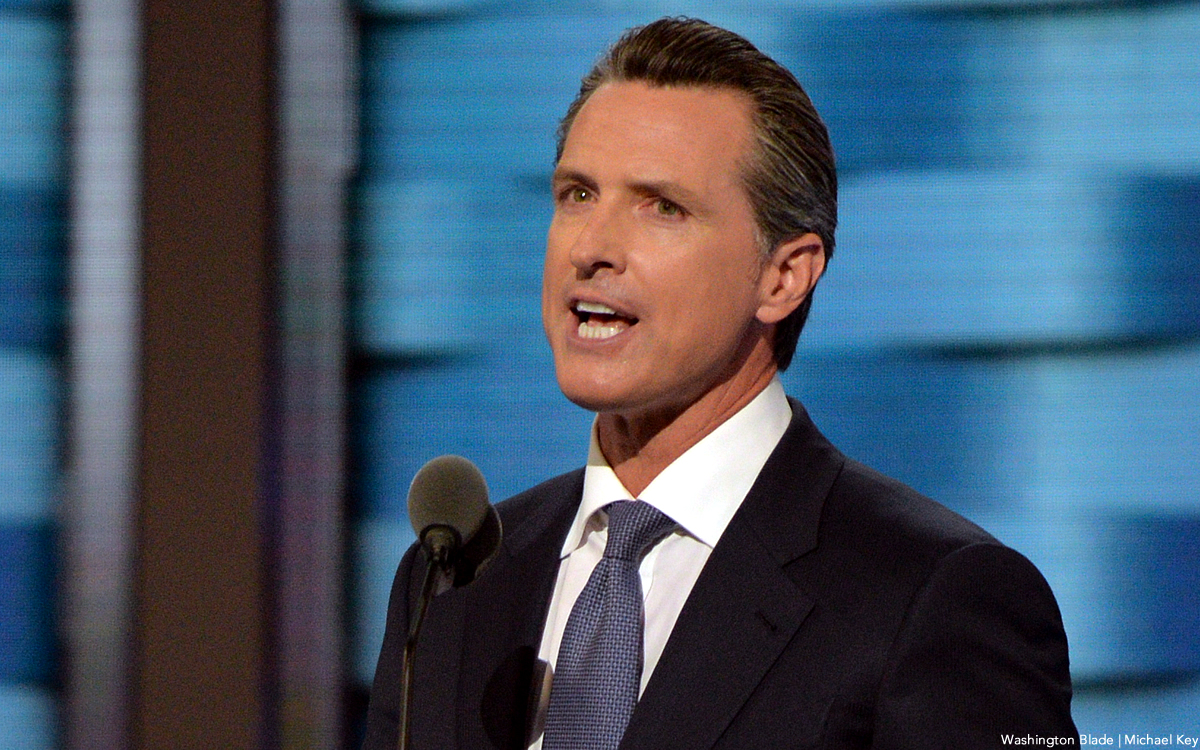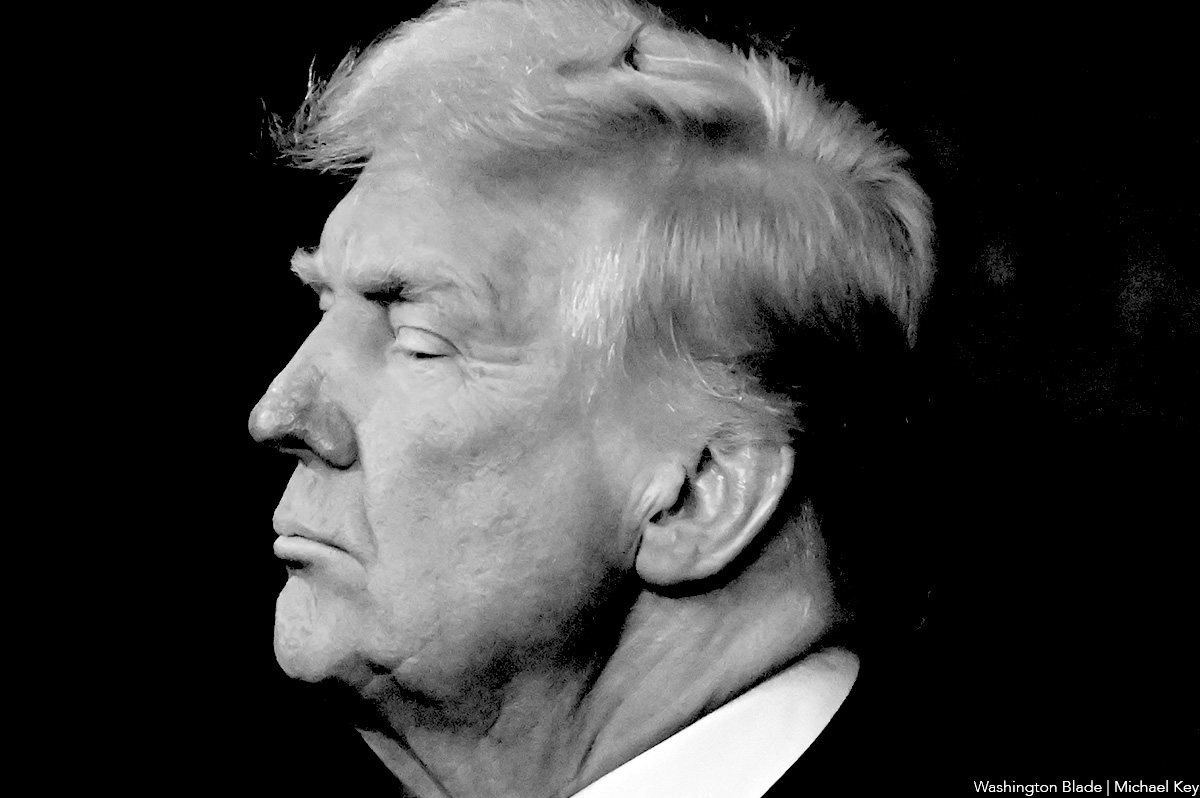Federal Government
Rachel Levine and AVP on approaching anti-LGBTQ hate as ‘public health threat’
White House LGBTQI+ Safety Partnership ‘ramping up’

Admiral Rachel Levine, assistant secretary for health at the U.S. Department of Health and Human Services, told the Washington Blade in a statement: “We know that hate — whether fueled by homophobia, transphobia, or racism — is a public health threat.”
“I look forward to a day in the future where hate-fueled violence, is an unwelcome memory of the past and no longer incites fear amongst LGBTQI+ people, and all people who live in America,” she said, adding, “We all deserve to live in communities safe from violence.”
A pediatrician and four-star officer who serves as the highest-ranking openly transgender official in U.S. history, Levine’s statement came in response to an inquiry about her meeting on Thursday with New York City Anti-Violence Project (AVP) Executive Director Beverly Tillery.
Also in attendance were the assistant secretary’s senior adviser on LGBTQI+ health equity, Adrian Shanker, and Lynn Rosenthal, director of Sexual and Gender-based Violence at the agency.
“We talked about some of the recommendations we have developed specifically for HHS,” Tillery told the Blade during a phone interview on Friday.
These focused on three areas, she said: “more work that will approach hate violence as a public health issue”; incorporating this approach and addressing “the needs of safe spaces on the ground” when implementing the White House LGBTQI+ Community Safety Partnership; and exploring “opportunities for funding and technical assistance for safe spaces.”
Tillery said that “it was a real honor to be able to have a conversation directly with” Levine, adding that during their meeting, the assistant secretary explained she had made a point of visiting LGBTQ spaces in person.
HHS understands that these groups provide and administer the services it funds, like legal aid and referrals to affirming healthcare providers, she said.
The agency “prioritizes those spaces,” with the knowledge that “we’re talking about a really critical infrastructure in our community,” a network of organizations that “holds our community together in terms of physical and mental health,” Tillery said.
Noting the escalation of violence encountered by LGBTQ individuals and spaces, the White House in June announced plans to create an LGBTQI+ Community Safety Partnership led by the U.S. Department of Homeland Security in coordination with the U.S. Department of Justice and HHS.
“We are now looking to the beginning of next year, kind of having a plan in place for what we think needs to be happening for next Pride season, really early, and also thinking about the election,” Tillery said. “This is a really critical time where we need to make sure that we get as much information and resources and boots on the ground so they can be actively thinking about safety in a bunch of different ways.”
The White House explained the Partnership will “Provide dedicated safety trainings for LGBTQI+ community organizations and increase federal threat briefings for LGBTQI+ organizations,” “protect health care providers who serve the LGBTQI+ community,” and “support LGBTQI+ communities to report hate crimes and build cross-community partnerships to address hate-fueled violence” — all while working “to build trust between LGBTQI+ organizations and federal law enforcement agencies.”
So far, Tillery said, “the bulk of the work right now that has been done rests in” the Department of Homeland Security, but “I do feel like, right now, they’re ramping up and figuring out [questions like] ‘who is going to be responsible for this thing and what is it going to look like?'”
She added that during Thursday’s meeting, “One of the things that we asked HHS to think about and help us think about is, ‘could there be some very public, regular cadence of meetings between organizations and the agencies specifically about this Partnership'” such that the public might be kept apprised of its progress?
“We are really hoping,” Tillery said, “to make sure that there’s a process for AVP and other organizations to be in regular communication with [the agencies] involved in the White House Community Safety Partnership.”
Tillery said she also talked with Levine and the other officials about ways that HHS, which unlike DHS and DOJ does not represent law enforcement, can contribute — such as by “having them play a role in data collection,” especially provided how the agency is already “paying attention to” data on sexual orientation and gender identity “across the board” and is well positioned to identify gaps.
The full spectrum of hate incidents targeting all types and sizes of LGBTQ spaces
For the past few months, Tillery has met with the White House, HHS, and members of Congress to discuss the first of its kind survey conducted by AVP and its corresponding report published in July, “Under Attack: 2022 LGBTQ+ Safe Spaces National Needs Assessment.”
The document contains feedback from LGBTQ groups of all types and sizes from all 50 states on the hate incidents they have experienced and “the critical needs they have for future safety.”
AVP discovered that nearly nine in 10 LGBTQ community centers experienced hate incidents in person or over the phone. The findings are consistent with the increase, from 2021 to 2022, in hate crimes motivated by bias against the victim’s sexual orientation and, especially, gender identity that were reported by the FBI on Oct. 16.
What distinguishes AVP’s report, Tillery told the Blade during a previous interview on Sept. 13, is that “nobody had really looked at this issue of what’s exactly happening with [LGBTQ] spaces across the country.”
She noted the importance of broadening the focus on anti-LGBTQ hate incidents to include not just acts of violence like last year’s the mass shooting at Club Q, but the full range of ways in which LGBTQ people are targeted or made to feel unsafe, and in all types of community spaces from book stores to bars and beyond.
When discussing the report and its findings in meetings on Capitol Hill, Tillery said “people are surprised” to learn the extent of anti-LGBTQ violence as well as “the range of different kinds of incidents that are happening across the country” and “the way these attacks are happening.”
About half of the surveyed LGBTQ groups said they did not report hate incidents to the police, with many respondents explaining that when their spaces were targeted with anti-LGBTQ protests led by white nationalist groups like the Proud Boys, they felt local law enforcement was more closely allied with or sympathetic to the extremists, Tillery said.
She noted the “overlay of gun violence with this as well,” especially in communities that do not have strong gun safety laws; places where, in many cases, anti-LGBTQ protesters showed up heavily armed.
Understanding intimate partner violence within the LGBTQ community
Tillery said she was encouraged by how much of her conversation with Levine, Shanker, and Rosenthal concerned issues of intimate partner violence within the LGBTQ community within the context of anti-LGBTQ violence more broadly.
She explained that victims are often made vulnerable by their sexual orientation, gender identity, or HIV status, and targeted not just with physical violence but also other forms of intimate partner abuse such as forced “outing,” blocking access to medication, or isolation from community and support networks.
The problem was exacerbated by the Covid pandemic, Tillery said, which caused many people to be “stuck at home with people who might be causing them harm.” Likewise, she said, LGBTQ youth who do not live in affirming, supportive homes in many cases “had to relive some of the homophobia and transphobia while they were in isolation with family members.”
The conversation about intimate partner violence dovetailed into other matters Tillery discussed with HHS, such as areas in which there is a deficit in data collection, she said.
For example, she pointed to the results of the Centers for Disease Control and Prevention’s 2021 Youth Risk Behavior Survey that were published in April, which had “great data” about experiences with intimate partner violence among gay and bisexual men and women but very little with respect to transgender and gender nonconforming respondents, Tillery said.
Tillery added that strong data is crucial for the Partnership’s work and beyond, carrying implications “down the road for funding and resources and congressional action.”
Looking ahead to prepare for next year’s Pride and election seasons
Another topic addressed on Thursday, Tillery said, was how best to “get out in front” with the work that must be done on matters of community safety and securing LGBTQ spaces ahead of not just the next Pride season but also the 2024 elections.
She said AVP will continue working with the Biden-Harris administration and other partners on implementing measures to protect the various groups, activists, organizers, and volunteers who will be running voter registration programs, participating in “get out the vote” efforts, and campaigning on behalf of candidates.
“We are now looking to the beginning of next year, kind of having a plan in place for what we think needs to be happening for next Pride season, really early, and also thinking about the election,” Tillery said.
“This is a really critical time where we need to make sure that we get as much information and resources and boots on the ground so they can be actively thinking about safety in a bunch of different ways,” she said.
Tillery added, “Hopefully we can get out in front of it, so that we can provide some groups with some resources and tools before they start doing a lot of those activities as the election season heats up,” she said.
Federal Government
UPenn erases Lia Thomas’s records as part of settlement with White House
University agreed to ban trans women from women’s sports teams

In a settlement with the Trump-Vance administration announced on Tuesday, the University of Pennsylvania will ban transgender athletes from competing and erase swimming records set by transgender former student Lia Thomas.
The U.S. Department of Education’s Office for Civil Rights found the university in violation of Title IX, the federal rights law barring sex based discrimination in educational institutions, by “permitting males to compete in women’s intercollegiate athletics and to occupy women-only intimate facilities.”
The statement issued by University of Pennsylvania President J. Larry Jameson highlighted how the law’s interpretation was changed substantially under President Donald Trump’s second term.
“The Department of Education OCR investigated the participation of one transgender athlete on the women’s swimming team three years ago, during the 2021-2022 swim season,” he wrote. “At that time, Penn was in compliance with NCAA eligibility rules and Title IX as then interpreted.”
Jameson continued, “Penn has always followed — and continues to follow — Title IX and the applicable policy of the NCAA regarding transgender athletes. NCAA eligibility rules changed in February 2025 with Executive Orders 14168 and 14201 and Penn will continue to adhere to these new rules.”
Writing that “we acknowledge that some student-athletes were disadvantaged by these rules” in place while Thomas was allowed to compete, the university president added, “We recognize this and will apologize to those who experienced a competitive disadvantage or experienced anxiety because of the policies in effect at the time.”
“Today’s resolution agreement with UPenn is yet another example of the Trump effect in action,” Education Secretary Linda McMahon said in a statement. “Thanks to the leadership of President Trump, UPenn has agreed both to apologize for its past Title IX violations and to ensure that women’s sports are protected at the university for future generations of female athletes.”
Under former President Joe Biden, the department’s Office of Civil Rights sought to protect against anti-LGBTQ discrimination in education, bringing investigations and enforcement actions in cases where school officials might, for example, require trans students to use restrooms and facilities consistent with their birth sex or fail to respond to peer harassment over their gender identity.
Much of the legal reasoning behind the Biden-Harris administration’s positions extended from the 2020 U.S. Supreme Court case Bostock v. Clayton County, which found that sex-based discrimination includes that which is based on sexual orientation or gender identity under Title VII rules covering employment practices.
The Trump-Vance administration last week put the state of California on notice that its trans athlete policies were, or once were, in violation of Title IX, which comes amid the ongoing battle with Maine over the same issue.
Federal Government
White House finds Calif. violated Title IX by allowing trans athletes in school sports
Education Department threatens ‘imminent enforcement action’

The Trump-Vance administration announced on Wednesday that California’s Interscholastic Federation and Department of Education violated federal Title IX rules for allowing transgender girls to compete in school sports.
In a press release, the U.S. Department of Education’s Office of Civil Rights threatened “imminent enforcement action” including “referral to the U.S. Department of Justice” and the withholding of federal education funding for the state if the parties do not “agree to change these unlawful practices within 10 days.”
The agency specified that to come into compliance; California must enforce a ban excluding transgender student athletes and reclaim any titles, records, and awards they had won.
Federal investigations of the California Interscholastic Federation and the state’s Department of Education were begun in February and April, respectively. The Justice Department sued Maine in April for allowing trans athletes to compete and refusing a similar proposal to certify compliance within 10 days.
Broadly, the Trump-Vance administration’s position is that girls who are made to compete against trans opponents or alongside trans teammates are unfairly disadvantaged, robbed of opportunities like athletics scholarships, and faced with increased risk of injury — constituting actionable claims of unlawful sex discrimination under Title IX.
This marks a major departure from how the previous administration enforced the law. For example, the Department of Education issued new Title IX guidelines in April 2024 that instructed schools and educational institutions covered by the statute to not enforce categorical bans against trans athletes, instead allowing for limited restrictions on eligibility if necessary to ensure fairness or safety at the high school or college level.
Sports aside, under former President Joe Biden the department’s Office of Civil Rights sought to protect against anti-LGBTQ discrimination in education, bringing investigations and enforcement actions in cases where school officials might, for example, require trans students to use restrooms and facilities consistent with their birth sex or fail to respond to peer harassment over their gender identity.
Much of the legal reasoning behind the Biden-Harris administration’s positions extended from the 2020 U.S. Supreme Court case Bostock v. Clayton County, which found that sex-based discrimination includes that which is based on sexual orientation or gender identity under Title VII rules covering employment practices.
A number of high profile Democrats, including California Gov. Gavin Newsom, have recently questioned or challenged the party’s position on transgender athletes, as noted in a statement by Education Secretary Linda McMahon included in Wednesday’s announcement.
“Although Gov. Gavin Newsom admitted months ago it was ‘deeply unfair’ to allow men to compete in women’s sports, both the California Department of Education and the California Interscholastic Federation continued as recently as a few weeks ago to allow men to steal female athletes’ well-deserved accolades and to subject them to the indignity of unfair and unsafe competitions.”
Federal Government
Trump’s dismantling of US foreign aid derails HIV prevention effort in Africa
FDA approved breakthrough preventative drug lenacapavir earlier this month

On June 18, the Food and Drug Administration approved a long-acting injectable for the prevention of HIV that could have a transformational impact on decades-long efforts to end the epidemic in the U.S. and abroad.
Offering robust protection with just two doses per year, lenacapavir has the potential to dramatically improve uptake and adherence compared to daily oral PrEP regimens like Truvada or Descovy, particularly for high risk populations living in places with poor health infrastructure or where stigma about HIV discourages frequent testing and clinic visits.
According to the New York Times, however, the rollout of lenacapavir for HIV prevention overseas has been stymied by the gutting of agencies, staff, programs, and funding dedicated to foreign aid and public health during President Donald Trump’s second term.
Among other moves, the administration has frozen or withdrawn nearly all U.S. foreign development assistance, dismantled the U.S. Agency for International Development and reduced the size of its workforce by more than 95 percent, and shuttered key public health units housed under the U.S. Department of Health and Human Services, the National Institutes of Health, the Centers for Disease Control and Prevention, and the FDA.
As a result, the Times reports, HIV programs across the African continent have been “scrambling to procure drugs that the United States once supplied, replace lost nurses and lab technicians, and restart shuttered programs to prevent new infections.”
Experts fear HIV infection rates are climbing in some of the hardest-hit countries, but since the U.S. pulled funding for data collection and monitoring, there is no way to know for sure.
Historically, the U.S. has provided about 75 percent of all global spending on efforts to fight the epidemic, a reflection of the extent to which there was broad bipartisan support for the allocation of resources for this purpose through programs like the President’s Emergency Plan for AIDS Relief. Trump continued this legacy in his first term, launching the ambitious Ending the HIV Epidemic initiative that was continued under former President Joe Biden.
After returning to the White House, however, the president and his administration have justified their slash-and-burn cuts to the federal government’s work in international development and public health by arguing that funds and resources sent to overseas nations are too often pilfered by corrupt foreign state actors or wasted on ineffectual programs.
Trump and his allies also believe the U.S. should no longer be expected to shoulder such a disproportionate share of the responsibility for foreign aid, and that other countries are likelier to step up and contribute more in response to America’s retreat.


















